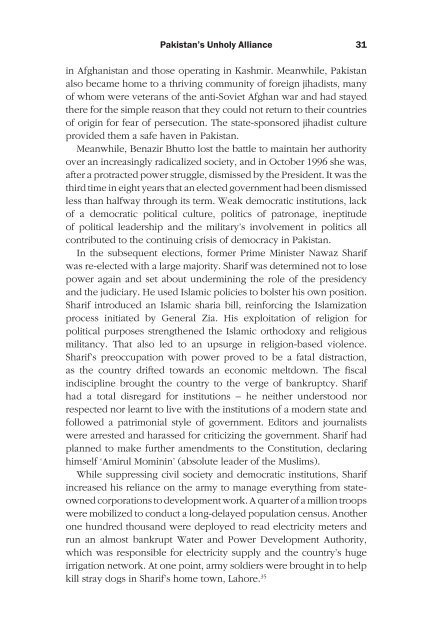Frontline Pakistan : The Struggle With Militant Islam - Arz-e-Pak
Frontline Pakistan : The Struggle With Militant Islam - Arz-e-Pak
Frontline Pakistan : The Struggle With Militant Islam - Arz-e-Pak
Create successful ePaper yourself
Turn your PDF publications into a flip-book with our unique Google optimized e-Paper software.
<strong><strong>Pak</strong>istan</strong>’s Unholy Alliance<br />
in Afghanistan and those operating in Kashmir. Meanwhile, <strong><strong>Pak</strong>istan</strong><br />
also became home to a thriving community of foreign jihadists, many<br />
of whom were veterans of the anti-Soviet Afghan war and had stayed<br />
there for the simple reason that they could not return to their countries<br />
of origin for fear of persecution. <strong>The</strong> state-sponsored jihadist culture<br />
provided them a safe haven in <strong><strong>Pak</strong>istan</strong>.<br />
Meanwhile, Benazir Bhutto lost the battle to maintain her authority<br />
over an increasingly radicalized society, and in October 1996 she was,<br />
after a protracted power struggle, dismissed by the President. It was the<br />
third time in eight years that an elected government had been dismissed<br />
less than halfway through its term. Weak democratic institutions, lack<br />
of a democratic political culture, politics of patronage, ineptitude<br />
of political leadership and the military’s involvement in politics all<br />
contributed to the continuing crisis of democracy in <strong><strong>Pak</strong>istan</strong>.<br />
In the subsequent elections, former Prime Minister Nawaz Sharif<br />
was re-elected with a large majority. Sharif was determined not to lose<br />
power again and set about undermining the role of the presidency<br />
and the judiciary. He used <strong>Islam</strong>ic policies to bolster his own position.<br />
Sharif introduced an <strong>Islam</strong>ic sharia bill, reinforcing the <strong>Islam</strong>ization<br />
process initiated by General Zia. His exploitation of religion for<br />
political purposes strengthened the <strong>Islam</strong>ic orthodoxy and religious<br />
militancy. That also led to an upsurge in religion-based violence.<br />
Sharif’s preoccupation with power proved to be a fatal distraction,<br />
as the country drifted towards an economic meltdown. <strong>The</strong> fiscal<br />
indiscipline brought the country to the verge of bankruptcy. Sharif<br />
had a total disregard for institutions – he neither understood nor<br />
respected nor learnt to live with the institutions of a modern state and<br />
followed a patrimonial style of government. Editors and journalists<br />
were arrested and harassed for criticizing the government. Sharif had<br />
planned to make further amendments to the Constitution, declaring<br />
himself ‘Amirul Mominin’ (absolute leader of the Muslims).<br />
While suppressing civil society and democratic institutions, Sharif<br />
increased his reliance on the army to manage everything from stateowned<br />
corporations to development work. A quarter of a million troops<br />
were mobilized to conduct a long-delayed population census. Another<br />
one hundred thousand were deployed to read electricity meters and<br />
run an almost bankrupt Water and Power Development Authority,<br />
which was responsible for electricity supply and the country’s huge<br />
irrigation network. At one point, army soldiers were brought in to help<br />
kill stray dogs in Sharif’s home town, Lahore. 35<br />
1













